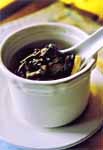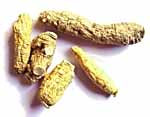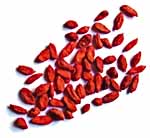|
The New Year's season, both Western
and Chinese, is a time to get rid of the old and ring
in the new. It's a time to make resolutions to improve
ourselves and the world around us. It's a time of high
purpose and inspiration. It's also a time to freeze
your butt off.
So, as a service to all you brave
souls out there weathering Beijing's inescapable urban
icebox, here's a sample of ingredients and dishes that
just might help get you through yet another bone-chilling,
teeth-chattering winter and to help ward off all the
inevitable ailments that come along with it.
For many Chinese, winter just wouldn't
be winter without a dose of Black Chicken Soup. No,
this is not your grandmother's chicken noodle soup,
but a Chinese specialty that is twice as potent as its
Western counterpart and valued for its medicinal properties.
Black chicken is literally what its name suggests -
a chicken born completely black, through and through,
from feathers to bones. It is said that this pitch-colored
poultry, stewed for hours to a rich and savory perfection,
aids the lungs and stomach and helps supplement the
blood. This nourishing quality is called zibu. Black
chicken is a strong tonic that helps prevents disease,
and is especially good for post-natal women and the
elderly.
"Black chicken is our most popular
traditional winter dish," says Jiao Jianwen, traditional
Chinese medicine expert and manager of Changchun Tang
Pharmacy. "It is most effective at fighting disease
when consumed in a soup with other medicinal ingredients."

Those ingredients include wolfberries,
or gouqi, a small reddish-orange, raisin-like fruit
which is good for the kidneys and brightens the eyes.
Another mainstay of the recipe is ginseng, pronounced
renshen in Mandarin, a time-tested herbal remedy considered
a cure-all that fills a whole variety of nutritional
needs.
Black chicken soup can be imbibed
at many restaurants in Beijing, but a particularly delicious
broth is brewed up at Ding Tai Zhen Restaurant (116
Dongsi Nan Dajie, 6522-7286/7578).
An alternative to black chicken soup
is a stewy concoction created by the head chef at the
Gourmet Garden Sichuan Restaurant (12 Changan Street,
6568-1607/2606) featuring black pigeon instead of chicken.
But if black chicken or pigeon is
not your cup of tea, so to speak, then try some ginger.
"Ginger is good for warming the stomach and achieving
optimal body temperature," says Jiao. "It is especially
effective for cold and dry climates like Beijing's."
The most common way to prepare ginger
to maximize its medicinal benefits is to brew it like
tea. The simplest method is to put slices of peeled
ginger and honey into water and then bring it to a boil.
Jiao's favorite recipe calls for mincing ginger, mixing
it with brown sugar and then boiling it down until it
gets almost as dense as molasses.
A less well-known and perhaps more
ordinary medicinal winter food is the radish, or luobo.
Xiao Wang's Home Restaurant stir-fries up a savory radish
dish featuring stewed pork. This hearty fare has the
dual benefit of revitalizing your organs and filling
your stomach.
But as far as vegetables go radish
is overshadowed by the ubiquitous cabbage, or baicai,
thanks to past winter-rationing measures. In fact, no
visit to northern China would be complete without seeing
stockpiles of the wrinkly, green bundles gathering soot
in doorways and hutongs (alleys) as soon as winter sets
in.
"There was a time not too long ago
when we had nothing else to eat in north China in winter,"
says Jiao. "But now it's not so important. Cabbage has
a lot of good vitamins, but radish has more and it can
also help you digest food."
Jiao recommends stewing radish chunks
in soup stock and mixing in medicinal herbs. According
to Jiao, to stay healthy in today's Beijing one should
always integrate food with medicinal ingredients. This
has always been the way in both the Chinese kitchen
and apothecary. Most importantly, when cooking, care
should be taken to retain vitamins and medicinal properties.
"Soup is often the best way to cook
things," says Jiao. "Especially in winter, the warming
effect is highly beneficial. There's also no oil required
and the liquid retains all of the nutritional elements
that would be lost in other methods of cooking."
For those who need a little red meat
now and then, stewed beef and mutton are also nourishing,
healthy winter foods. Fried and roasted meats are also
good. But, since many of the beneficial elements are
lost to extreme heat, it's also best to prepare them
in soups, Jiao points out.
Those who want to stay healthy but
don't want to eat soup every meal may wish to consider
a new variation on the tried and true dumpling.
Uncle Khang's Dumpling Restaurant
(8 Baishiqiao Street, 6832-5688/5788) features boiled
pork and vegetarian dumplings. The dumplings are made
to simulate a mini-soup contained in a little dough
pocket. The effect is a meal that melts in your mouth,
and offers the same nutritional value as a hearty soup.
Other healthy winter foods worthy
of honorable mention include Chinese dates, or zao;
tianma, a Chinese tuber, and for the truly adventurous
- dongchongxiacao - or Chinese caterpillar-like fungus.
The dates are beneficial for the eyes and blood circulation,
while tianma goes straight to the head, helping with
brain functions and alleviation of headache pain. The
fungus is considered to be generally good for you, and
said to be most potent when brewed in a strong liquor.
So to tough out the rest of this
season, stay warm and keep all these tips in mind when
the first cough of the new year tickles the back of
your throat.
|





